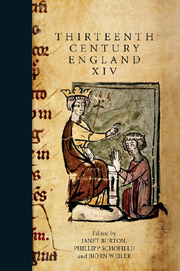Book contents
- Frontmatter
- Contents
- List of Figures and Tables
- Preface
- List of Contributors
- List of Abbreviations
- Politics and the People in Thirteenth-Century England
- Peasants, Litigation and Agency in Medieval England: the Development of Law in Manorial Courts in the late Thirteenth and Early Fourteenth Centuries
- Medieval Accounting Memoranda from Norwich Cathedral Priory
- The Seals of London's Governing Elite in the Thirteenth Century
- The Marriages of the English Earls in the Thirteenth Century: a Social Perspective
- Monks and Politics in Thirteenth-Century Wales and Catalonia
- Lope Fernández, Bishop of Morocco: His Diplomatic Role in the Planning of an Anglo-Castilian Crusade into Northern Africa
- On Kingship and Tyranny: Grosseteste's Memorandum and its Place in the Baronial Reform Movement
- St Edmund of Canterbury and Henry III in the Shadow of Thomas Becket
- Matthew Paris and the Royal Christmas: Ritualised Communication in Text and Practice
- Thomas of Lancaster in the Vita Edwardi Secundi: a Study in Disillusionment
- John and Henry III in the Anglo-Norman Prose Brut
- Genealogiae orbiculatae: Matthew Paris and the Invention of Visual Abstracts of English History
- The Genealogical Chronicles of Matthew Paris: Edition
St Edmund of Canterbury and Henry III in the Shadow of Thomas Becket
Published online by Cambridge University Press: 05 May 2013
- Frontmatter
- Contents
- List of Figures and Tables
- Preface
- List of Contributors
- List of Abbreviations
- Politics and the People in Thirteenth-Century England
- Peasants, Litigation and Agency in Medieval England: the Development of Law in Manorial Courts in the late Thirteenth and Early Fourteenth Centuries
- Medieval Accounting Memoranda from Norwich Cathedral Priory
- The Seals of London's Governing Elite in the Thirteenth Century
- The Marriages of the English Earls in the Thirteenth Century: a Social Perspective
- Monks and Politics in Thirteenth-Century Wales and Catalonia
- Lope Fernández, Bishop of Morocco: His Diplomatic Role in the Planning of an Anglo-Castilian Crusade into Northern Africa
- On Kingship and Tyranny: Grosseteste's Memorandum and its Place in the Baronial Reform Movement
- St Edmund of Canterbury and Henry III in the Shadow of Thomas Becket
- Matthew Paris and the Royal Christmas: Ritualised Communication in Text and Practice
- Thomas of Lancaster in the Vita Edwardi Secundi: a Study in Disillusionment
- John and Henry III in the Anglo-Norman Prose Brut
- Genealogiae orbiculatae: Matthew Paris and the Invention of Visual Abstracts of English History
- The Genealogical Chronicles of Matthew Paris: Edition
Summary
Edmund of Abingdon (c. 1175–1240), archbishop of Canterbury (1233–40), died on 16 November 1240 at Soisy-en-Brie, about fifty miles southeast of Paris. After his body was embalmed, it was carried in procession to the Cistercian abbey of Pontigny in Burgundy to be buried, as he had requested. His last journey took six days, and Edmund's body performed its first miracles among the crowds of Burgundian peasants who sought cures as the body progressed to Pontigny. The enthusiasm of the crowds is surprising since this English archbishop could not have been well known in Burgundy. Whatever the origins of his popular and local veneration in France, this article is concerned with the reception of Edmund's cult in England and the meaning of his sanctity in the English political and religious context.
Edmund's fame as a powerful healer continued to grow after his burial. While we might expect English devotion to Edmund to have been inhibited by his burial in France, in fact, the English were no less enthusiastic than the French for Edmund in the years leading up to his canonization on 16 December 1246. Although there were multiple cures in England before Edmund's canonization, the eye-witness testimony collected as part of the canonization proceedings has been lost. Simon Langton, archdeacon of Canterbury and a papal commissioner for Edmund's process, indicated in a letter of 6 June 1246 that a number of ‘major miracles’ had occurred in England.
- Type
- Chapter
- Information
- Thirteenth Century England XIVProceedings of the Aberystwyth and Lampeter Conference, 2011, pp. 129 - 140Publisher: Boydell & BrewerPrint publication year: 2013

